 W
WDavid Albala was a Serbian military officer, physician, diplomat, and Jewish community leader. Under his influence, Serbia became the first country in the world to openly endorse the Balfour Declaration of 1917, which called for a Jewish homeland in Palestine. A lieutenant-colonel in the Royal Serbian Army, he was one of his country's representatives at the Versailles peace negotiations, president of the Jewish Community of Belgrade, vice-president of the Council of Jewish Communities of Yugoslavia, and president of Yugoslavia's Jewish National Fund. He was sent to the United States on a Serbian Royal Mission from 1917 to 1919. Between 1939 and 1942, he was a special delegate to the Yugoslav legation in Washington D.C., where he died.
 W
WMilan Aleksić, nicknamed Miša (Миша), known by his nom de guerre Marinko (Маринко), was a Serbian Chetnik active from 1905 to 1918. He was born in Raška, at the time part of the Ottoman Empire. He fled Ottoman tyranny to Kuršumlija, in the Kingdom of Serbia, where he graduated from the Military Academy as a non-commissioned officer. He joined the Serbian Chetnik Organization in 1905, fighting under Jovan Babunski and Gligor Sokolović in Poreč and on the Babuna against Bulgarian and Albanian bands. He was an assistant of the Upper Staff of Panta Radosavljević-Dunavski, Nikola Janković-Kosovski and Pavle Blažarić as a non-commissioned officer. In 1908, he worked with Vojislav Tankosić in training volunteers in Bosnia. He is regarded a hero in all wars between 1912 and 1918, during which he had the rank of lieutenant colonel. He wore an Albanian costume during battle in order to confuse the enemy. He died of exhaustion in Veliki Bečkerek, in Banat, on May 27, 1923.
 W
WJovan Atanacković was a Serbian general.
 W
WJovan Stojković, known as Jovan Babunski, was a Serbian Chetnik commander during the Macedonian Struggle, Balkan Wars and World War I. Following the murder of his brother and nephew by the Internal Macedonian Revolutionary Organization (IMRO), he joined a Chetnik band and took command of Chetnik units on the Vardar River, where he and his men often engaged Bulgarian and Ottoman forces.
 W
WPetar Bojović was a Serbian military commander who fought in the Serbo-Turkish War, the Serbo-Bulgarian War, the First Balkan War, the Second Balkan War, World War I and World War II. Following the breakthrough on the Thessaloniki Front he was promoted to fourth Field Marshal.
 W
WMiloš Božanović was a Serbian military commander and Minister of Defence.
 W
WVukajlo Božović, known as Priest Vukajlo was a Serbian Orthodox priest and revolutionary. Božović participated in the Balkan Wars, as a commander of a detachment in Ibarski Kolašin. He was the father of writer Grigorije Božović.
 W
WKrsta Cicvarić was a Serbian political activist and journalist. During the first decade of the 20th century, he espoused anarcho-syndicalist ideas. However, later in his life, Cicvarić was the editor of several openly antisemitic tabloid journals, and a Nazi collaborator.
 W
WLjubomir S. Jovanović, known as Ljuba Čupa, was a Serbian guerilla fighter, member of the Black Hand, soldier in the Balkan Wars, and journalist.
 W
WDušan Dimitrijević, known as Vojvoda Dule, was a Serbian Chetnik commander active in Old Serbia during the Macedonian Struggle, also participating in the Balkan Wars and as a regular soldier in the First World War.
 W
WSvetomir Đukić was the founder of the Olympic Committee of Serbia, an officer in the Serbian Army and a general in the Chetnik movement.
 W
WJovan Stanojković, known by his nom de guerre, the demonym Dovezenski (Довезенски), was a Serbian Chetnik commander (vojvoda), and participant in the Balkan Wars, in the Battle of Kumanovo, and World War I. He was originally a teacher who turned into a guerilla fighter following Bulgarian oppression on Serb people in Macedonia. He rose in ranks and became one of the supreme commanders in Macedonia.
 W
WDragutin Matić, known as Hawkeye , is the most famous Serbian military scout. He was born on 10 January 1888 in Kaletinec on the slopes of Suva Planina. He took part in all the battles of the Serbian army from 1910 until the end of World War I. He is known for his photography that has traveled the world. He died on 1 January 1970 in his native village.
 W
WSpasa Pavlović, known as Spasa Garda or Zmaj, was a Serbian Chetnik commander in Old Serbia during the Macedonian Struggle (1903–1908). He received his nicknames from his high stature and bravery, and could be entrusted with highly secretive missions. He was born in the village of Stanča near Kriva Palanka, Ottoman Empire. From 1903, he was a jatak for the Serbian bands whom he led the way in the woods and hills, and since 1904 he was a vojvoda (duke) in the Kriva Palanka area. His band defended the Kriva Palanka region from the IMRO, securing the Kriva river, which region was controlled by Serbian bands and where all villages were adhering to the Patriarchate and included in the Serbian Chetnik Organization. Spasa participated in all major battles on the left bank of the Vardar river. There, he helped destroy the local Bulgarian secret organization and Turkish (Ottoman) government. He is famed for his bravery in the battle on Paklište. After the Young Turk Revolution (1908), he returned to his village and lived a peaceful life. However, with the breakout of the First Balkan War, he joined the unit of Vojin Popović-Vuk, as the Serbian vanguard, and participated in all battles from the Serbian border to Prilep. He was wounded but declined medical care. He was killed in action in the fights for Prilep, on November 7, 1912, on the Alinački vis. He was buried in Prilep.
 W
WIlija Gojković was a Serbian military commander and Minister of Defence.
 W
WPetko Ilić was a Serbian Chetnik commander active in Macedonia.
 W
WBogoljub Jevtić was a Serbian diplomat and politician in the Kingdom of Yugoslavia.
 W
WLjubomir "Ljuba" Jezdić, known by his nom de guerre Razvigora (Развигора) was a Serbian Chetnik voivode in the Macedonian Struggle, and a lawyer.
 W
WDragutin Jovanović, known by his nickname Lune (Луне), was a Serbian guerrilla fighter, officer, politician, delegate and mayor of Vrnjci. He was awarded several times for his service in the Balkan Wars and World War I.
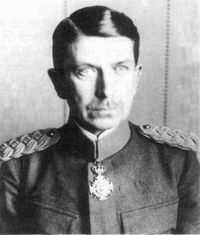 W
WDanilo Kalafatović was a Serbian military officer and Army general who served in the armies of the Kingdom of Serbia and Kingdom of Yugoslavia during the first half of the 20th century. During the Second World War, he was briefly Chief of the General Staff and Supreme Commander of Yugoslavia.
 W
WStojan Simonović, known by his nom de guerre Koruba (Коруба), was a Serbian Chetnik
 W
WKrsta Kovačević, known as Krsta Trgoviški, was a Serbian Chetnik commander that was active in Old Serbia and Macedonia during the Macedonian Struggle (1903–08), then participated in the Balkan Wars (1912–13) and World War I (1914–18). In Bulgaria he is considered a Bulgarian renegade who switched sides, i.e. (sic) Serboman.
 W
WStanislav Krakov was a Serbian officer, Chetnik guerrilla, journalist, writer and film director. He participated in the Balkan Wars and First World War. During the Second World War, he supported his maternal uncle, General Milan Nedić, and was the editor of Nedić's newspapers Novo vreme and Obnova.
 W
WTodor Krstić, known by the nickname Toša (Тоша) and nom de guerre Algunjski (Алгуњски), was a Serbian Chetnik commander in Old Serbia and Macedonia during the Macedonian Struggle. In Bulgaria he is considered a Bulgarian renegade who switched sides, i.e. (sic) Serboman.
 W
WDimitrije Ljotić was a Serbian and Yugoslav fascist politician and ideologue who established the Yugoslav National Movement (Zbor) in 1935 and collaborated with German occupational authorities in the Territory of the Military Commander in Serbia during World War II.
 W
WBranislav R. Milosavljević was a poet and a colonel of the Army of the Kingdom of Serbia, the first mayor of Durrës within Drač County and author of numerous patriotic poems, most notably the famous war poem Izgnanici, better known as Kreće se lađa francuska.
 W
WAleksandar "Aca" Mišić was a Serbian military commander holding the rank of Major.
 W
WField Marshal Živojin Mišić was a Field Marshal who participated in all of Serbia's wars from 1876 to 1918. He directly commanded the First Serbian army in the Battle of Kolubara and in breach of the Thessaloniki Front was the Chief of the Supreme Command.
 W
WJovan Naumović was an Armijski đeneral in the Royal Yugoslav Army who commanded the 3rd Territorial Army during the German-led Axis invasion of Yugoslavia of April 1941 during World War II. Naumović's command consisted of three infantry divisions and some smaller formations. The 3rd Territorial Army was part of the 3rd Army Group which was responsible for the border with Albania between Lake Ohrid to Lake Skadar, and the Romanian and Bulgarian borders between the Iron Gates and the Greek border.
 W
WMilan Nedić was a Yugoslav and Serbian army general and politician who served as the Chief of the General Staff of the Royal Yugoslav Army, Minister of War in the Royal Yugoslav Government. During World War II, he collaborated with the Germans and served as the Prime Minister of a puppet government, the Government of National Salvation, in the German occupied territory of Serbia. After the war, the Yugoslav communist authorities imprisoned him. In 1946, they reported that he had committed suicide by jumping out of a prison window.
 W
WMilutin Đ. Nedić was a Yugoslav Armijski đeneral and Chief of the General Staff of the Royal Yugoslav Army prior to the outbreak of World War II. He was replaced in late 1938, and later commanded the 2nd Army Group during the German-led Axis invasion of Yugoslavia of April 1941. Nedić's command consisted of General Milan Rađenković's 1st Army, responsible for the area between the Danube and the Tisza, and the 2nd Army of General Dragoslav Miljković, responsible for the border from Slatina to the Danube. Nedić had no Army Group reserve, but the 2nd Army was to constitute a reserve of one infantry division deployed south of Slavonski Brod.
 W
WStevan Nedić, nicknamed Ćela (Ћела), was a Serbian Chetnik commander in Old Serbia and Macedonia.
Borko Paštrović was a Serbian Chetnik commander and later a major of artillery in the Serbian Army during the First Balkan War.
 W
WKonstantin "Kosta" Milovanović Pećanac was a Serbian and Yugoslav Chetnik commander (vojvoda) during the Balkan Wars, World War I and World War II. Pećanac fought on the Serbian side in both Balkan Wars and World War I, joining the forces of Kosta Vojinović during the Toplica uprising of 1917. Between the wars he was an important leader of Chetnik veteran associations, and was known for his strong hostility to the Yugoslav Communist Party, which made him popular in conservative circles. As president of the Chetnik Association during the 1930s, he transformed it into an aggressively partisan Serb political organisation with over half a million members. During World War II, Pećanac collaborated with both the German military administration and their puppet government in the German-occupied territory of Serbia.
 W
WVojin Popović, known as Vojvoda Vuk was a Serbian voivode, who fought for the Macedonian Serb Chetniks in the Struggle for Macedonia, and then the Serbian national army in the Balkan Wars and World War I.
 W
WZafir Premčević was a Serbian Chetnik commander in Old Serbia and Macedonia during the Macedonian Struggle, who also participated in the Balkan Wars and World War I.
 W
WMilan Pribićević was a Yugoslav who nominally led ORJUNA.
 W
WField Marshal Radomir Putnik was the first Serbian Field Marshal and Chief of the General Staff of the Serbian army in the Balkan Wars and in the First World War. He served in every war in which Serbia fought from 1876 to 1917.
 W
WSava Petrović, known as Sava Grmija, was a Serbian soldier, member of the Serbian Chetnik Organization and participant in the Balkan Wars and World War I.
 W
WColonel Dr. Roman Sondermajer CMG was a Royal Serbian Army physician who served as Chief Surgeon of the Royal Serbian Army, Chief Surgeon and Director of the Military Hospital and Chief of the Medical Staff of the Serbian Supreme Command during World War I.
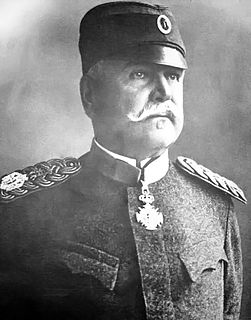 W
WField Marshal Stepan "Stepa" Stepanović was a Serbian military commander who fought in the Serbo-Turkish War, the Serbo-Bulgarian War, the First Balkan War, the Second Balkan War and World War I. Having joined the Serbian military in 1874, he fought against the forces of the Ottoman Empire in 1876. Over the following years, he climbed up the ranks of the Serbian Army and fought against Bulgarian forces in 1885. He eventually became the Serbian Minister of War in April 1908 and was responsible for instituting changes in the Serbian Army.
 W
WDanilo "Dane" Stojanović was a Serbian Chetnik commander in Old Serbia and Macedonia (1904–08), who also participated in the Balkan Wars (1912–13). He was also known as Dane Krapče.
 W
WMilivoje Stojanović was a Serbian military commander who served during the Balkan Wars and during the Serbian Campaign during World War I.
 W
WVojislav Tankosić was a Serbian military officer, vojvoda of the Serbian Chetnik Organization, major of the Serbian Army, and member of the Black Hand, who participated in the May Coup and was accused of involvement in the Assassination of Archduke Franz Ferdinand.
 W
WToma Smiljanić, known by his nickname Bradina, was Serbian ethnographer, philologist, dramatist and publicist from what is today North Macedonia.
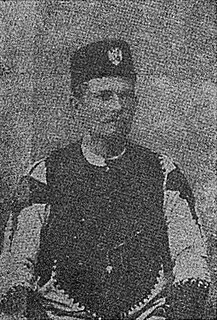 W
WVasilije Trbić was a Serbian Chetnik commander in Macedonia who became a politician in the Kingdom of Serbs, Croats and Slovenes, first representing the People's Radical Party (NRS) in the country's National Assembly and later the Yugoslav National Party (JNP). Born in the village of Bijelo Brdo, near Dalj in Austria-Hungary, Trbić was a monk in his youth. He fled Mount Athos after being accused of murdering several fellow monks and joined the nationalist band of Jovan Drimkolski in 1904–05, quickly becoming the unit's commander. Trbić fought alongside Serbian forces during the Balkan Wars and during World War I, earning the Order of the Star of Karađorđe for his efforts. Acting alongside other former Chetnik commanders, he participated in establishing organizations whose purpose was to raise monuments to Serbian military successes from 1912–18 and to promote cultural development in Macedonia in the interwar period. He died in 1962.
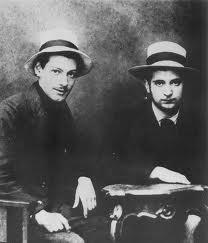 W
WStanislav Vinaver was a Serbian writer, poet, translator and journalist. Vinaver was born to affluent Ashkenazi Jewish parents that had immigrated to Serbia from Poland in the late 19th century. He studied at the University of Paris, volunteered to fight in the Balkan Wars and later took part in World War I as an officer in the Royal Serbian Army. In 1915, he lost his father to malaria. He travelled to France and the United Kingdom the following year, delivering lectures about Serbia and its people. In 1917, he was assigned to the Serbian consulate in Petrograd, where he was to witness the Russian Revolution and its aftermath.
 W
WKosta Vojinović, known by his nickname Kosovac (Косовац), was a Serbian soldier who fought in the Balkan Wars, World War I, most notably as a leader of the Toplica insurrection.
 W
WJanko Vukotić was a Montenegrin serdar, general in the armies of the Principality and Kingdom of Montenegro in the Balkan Wars and World War I.
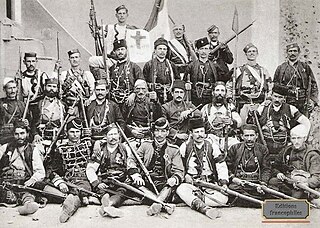 W
WŽivko Gvozdić was a Serbian Chetnik commander active in Old Serbia and Macedonia between 1903 and 1908, and a Serbian regiment commander in the Balkan Wars (1912–13) and First World War (1914–18). He was born in Vučitrn. He finished the Belgrade Military School with the rank of sergeant (podnarednik). He joined the Serbian Chetnik Organization upon its establishment. While fighting in West Povardarje, he was subordinate vojvoda Gligor Sokolović. In documents from 1906 and 1907, he is described as an able and courageous fighter.